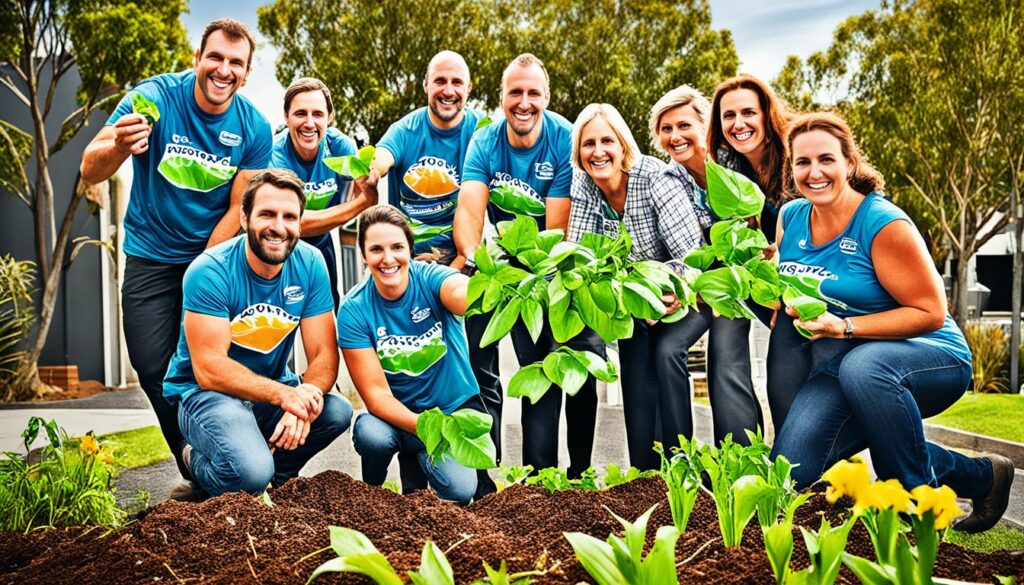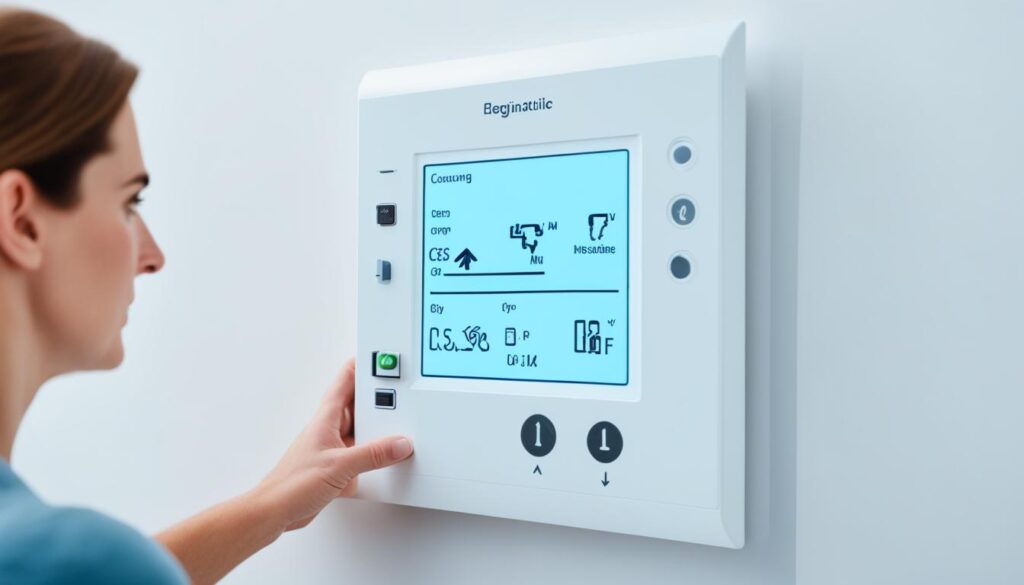The energy efficiency of buildings is a significant factor in overall energy consumption. Residential energy efficiency plays a crucial role in achieving global energy sustainability. There have been numerous projects aimed at changing the behaviour of residential energy users in order to improve household energy efficiency. These projects focus on adjusting housing stock and promoting eco-friendly practices. However, one group that has been under-supported in this area is Indigenous people. They face significant disadvantages in terms of health, education, employment, and access to electricity. Programs delivering energy efficiency support are crucial for addressing the needs of vulnerable populations.
Key Takeaways:
- Behavioral change is crucial for improved energy efficiency and sustainable living in Melbourne.
- Indigenous households face unique challenges and require special attention in energy efficiency programs.
- Promoting eco-friendly practices and adjusting housing stock are effective strategies for energy conservation.
- Energy efficiency initiatives can lead to improved comfort and wellbeing in low-income households.
- Investing in renewable energy and implementing eco-friendly practices contribute to a more sustainable future.
The Importance of Energy Efficiency in Buildings
The energy efficiency of buildings is a substantial component of energy consumption. Residential energy efficiency plays a key role in achieving global energy sustainability. Efforts to improve energy efficiency in buildings include adjusting housing stock for new and existing homes, such as improving energy requirements in building codes, insulation, window coverings, and appliances.
“Energy efficiency is not just a trend; it is essential for the future of our planet.”
These efforts attract substantial government attention and aim to reduce energy consumption and promote sustainable living. By implementing energy-efficient measures, we not only save on energy costs but also reduce our environmental impact. Green buildings are becoming increasingly popular, emphasizing the importance of incorporating energy efficiency into the design and construction process.
Benefits of Energy Efficiency in Buildings
- Lower energy bills
- Reduced greenhouse gas emissions
- Improved comfort and indoor air quality
- Increased property value
- Enhanced reputation and marketability
With rising concerns about climate change and the limited availability of natural resources, energy efficiency in buildings is more crucial than ever. Not only does it help us save money, but it also reduces our carbon footprint and creates healthier living environments.
Image:
Challenges and Disadvantages Faced by Indigenous Australians
Indigenous Australians face hardships and disadvantages in proportions higher than other Australians. They experience discrepancies in health, mortality, education, and employment compared to non-Indigenous Australians. When it comes to their experience in the energy sector, Indigenous households face substantial energy-related disadvantages, such as higher rates of electricity disconnections. These disadvantages are a result of limited access to electricity and worsening mental health. Expanding energy efficiency programs to Indigenous households is essential for addressing these disadvantages.
| Disadvantages Faced by Indigenous Australians | Solutions |
|---|---|
| Limited access to electricity | Expanding energy efficiency programs to Indigenous households will provide access to electricity and reduce the risk of disconnections. |
| Worsening mental health | Implementing energy efficiency measures in Indigenous households can improve living conditions and contribute to better mental well-being. |
Indigenous Australians, like all Australians, deserve equal opportunities and access to vital resources such as electricity. By addressing the energy-related disadvantages faced by Indigenous households, we can work towards a more equitable energy landscape and foster social and environmental justice.
The Benefits of Energy Efficiency Behavior Change
Energy efficiency behavior change offers a multitude of benefits that go beyond simply reducing energy consumption and lowering utility bills. By improving home energy efficiency, individuals can experience a range of positive outcomes, including:
- Reduced stress: Implementing energy-efficient practices can alleviate concerns about high energy costs and financial strain, providing peace of mind and reducing stress levels.
- Improved comfort: Energy efficiency measures such as proper insulation, efficient heating, and cooling systems, and smart home technologies can enhance indoor comfort by maintaining consistent temperatures throughout the year.
- Greater self-efficacy and control: Making conscious choices to optimize energy use fosters a sense of empowerment, as individuals become aware of their impact on the environment and gain control over their energy consumption.
- Improved health and well-being: Energy-efficient homes contribute to healthier living environments, reducing the risk of indoor air pollution, mold, and dampness. This leads to improved respiratory health and overall well-being.
These benefits are particularly important for vulnerable households, including Indigenous households, who may face additional challenges related to energy usage. By promoting behavior change and implementing energy-efficient practices, we can create a more sustainable living environment for all residents of Melbourne.
“Implementing energy-efficient practices can alleviate concerns about high energy costs and financial strain, providing peace of mind and reducing stress levels.”

Improved Comfort for Vulnerable Households
Vulnerable households, such as Indigenous households, can greatly benefit from energy efficiency behavior change initiatives. Enhancing home energy efficiency improves comfort levels, creating a safer and more pleasant living environment. These improvements contribute to the overall well-being and quality of life for individuals facing energy-related challenges. By prioritizing energy efficiency and behavior change, we can ensure that all households, regardless of their circumstances, can enjoy the benefits of improved comfort and reduced energy use.
Understanding Well-being for Indigenous People
Well-being for Indigenous people encompasses more than just physical health. It includes social, emotional, spiritual, and cultural well-being, and factors beyond the absence of disease. Cultural continuity and strength play a protective role for Indigenous people. When evaluating the impact of energy efficiency initiatives on Indigenous households, it is important to consider these broader aspects of well-being and address any cultural needs.
Indigenous people in Australia have a unique relationship with the land and their cultural practices. Their well-being is deeply intertwined with their connection to their ancestors, traditions, language, and spirituality. It goes beyond mere physical health and extends to social and emotional dimensions as well.
Indigenous communities have long recognized the importance of cultural well-being and its impact on overall health outcomes. By preserving and promoting their cultural heritage, Indigenous people can strengthen their sense of identity, resilience, and social support networks. This, in turn, positively influences their well-being and contributes to improved health outcomes in their communities.
Elevating Cultural Well-being
Addressing the well-being of Indigenous people goes beyond the conventional understanding of health. It requires a holistic approach that acknowledges the significance of cultural well-being. By involving Indigenous communities in the design and implementation of energy efficiency initiatives, we can ensure that their unique cultural needs and values are respected and integrated.
“Empowering Indigenous communities to take ownership of their energy usage and incorporating their cultural values into energy efficiency programs fosters a sense of pride, self-determination, and overall well-being among Indigenous households.”
Furthermore, it is essential to consider the broader social and environmental impact of energy efficiency initiatives on Indigenous communities. By promoting sustainable practices and renewable energy sources, we can contribute to a more environmentally friendly future while respecting the cultural integrity and well-being of Indigenous people.
By recognizing the importance of cultural well-being and integrating it into energy efficiency programs, we can ensure that the benefits extend beyond economic and environmental factors. Indigenous households can experience improved quality of life, cultural resilience, and a stronger sense of identity, leading to enhanced well-being and health outcomes for their communities.
Social Marketing for Behavior Change
Social marketing is a powerful approach that aims to drive behavior change for improved social and environmental outcomes. When applied to the realm of energy efficiency, social marketing can effectively guide individuals and communities towards enhanced energy usage practices, resulting in both personal and societal benefits. By employing targeted strategies and interventions, social marketing encourages people to make more efficient and effective use of heating, cooling, and household appliances. Furthermore, it takes into account the specific characteristics and circumstances of each dwelling and its occupants, including the type of home and family size.
“Social marketing is a highly effective tool for promoting behavior change, leading to improved energy efficiency and positive social outcomes.”
Harnessing the power of social influence and messaging, social marketing campaigns create awareness, shift attitudes, and motivate individuals and communities to adopt energy-efficient practices. These campaigns utilize various channels, such as social media, community events, and targeted advertisements, to effectively reach and engage the target audience.
Through social marketing, individuals are empowered to make informed choices that not only benefit their energy consumption but also contribute to the overall well-being of society. By reducing energy waste and improving efficiency, individuals can lower their carbon footprint, conserve natural resources, and save on energy costs. This, in turn, leads to improved social outcomes, such as reduced environmental impact, enhanced sustainability, and the creation of healthier, more prosperous communities.
Key Benefits of Social Marketing for Energy Efficiency:
- Fosters behavior change towards improved energy efficiency
- Raises awareness about sustainable energy practices
- Empowers individuals to make informed energy-related choices
- Reduces energy waste and carbon footprint
- Conserves natural resources
- Enhances sustainability, both at an individual and societal level
- Creates healthier and more prosperous communities
“Social marketing plays a vital role in promoting positive behavior change and driving improvements in energy efficiency, leading to a more sustainable and environmentally friendly future.”
The Koorie Energy Efficiency Project (KEEP)
The Koorie Energy Efficiency Project (KEEP) was developed to address the energy-related disadvantages faced by Indigenous households in Victoria. It provided energy efficiency support to Indigenous homes through home energy efficiency visits, tips, and advocacy. KEEP was implemented as a social marketing project led by a not-for-profit organization, employing Indigenous individuals to deliver tailored support to Indigenous households. The project aimed to improve energy efficiency outcomes and reduce energy-related disadvantages for Indigenous households in a culturally suitable way, enhancing their overall well-being and quality of life.

Highlights of the Koorie Energy Efficiency Project (KEEP)
- Targeted energy efficiency support for Indigenous households in Victoria
- Home energy efficiency visits to assess and provide recommendations
- Tailored tips and advice to improve energy efficiency
- Advocacy support for Indigenous households
- Delivered by Indigenous individuals with cultural understanding
Benefits of the Koorie Energy Efficiency Project:
The Koorie Energy Efficiency Project (KEEP) brought numerous benefits to Indigenous households in Victoria. By improving the energy efficiency of their homes, Indigenous households experienced:
- Reduced energy costs, resulting in financial savings
- Enhanced comfort and well-being through improved heating and cooling
- Decreased environmental impact by reducing energy consumption
- Increased knowledge and awareness of energy efficiency practices
- Empowered and supported Indigenous communities in achieving sustainable living
With the successful implementation of the Koorie Energy Efficiency Project (KEEP), Indigenous households in Victoria were able to overcome energy-related disadvantages and improve their overall quality of life while contributing to a more sustainable future.
The Victorian Energy Upgrades (VEU) Program
The Victorian Energy Upgrades (VEU) program in Melbourne is an excellent initiative that aims to help households reduce their power bills and minimize greenhouse gas emissions. By providing incentives for upgrading energy-efficient products, the program contributes to both cost savings and environmental sustainability.
The VEU program offers incentives for upgrading various appliances and equipment that consume significant amounts of energy. These include lighting, space heating and cooling systems, water heating, and draft sealing. By encouraging the adoption of energy-efficient alternatives, the program helps households reduce their energy consumption and, consequently, their power bills.
Participating in the VEU program is open to every Victorian household. By taking advantage of this program, households can save between $120 and $1,100 annually on energy costs. These savings can make a significant difference in day-to-day expenses and provide homeowners with more financial flexibility.
One of the key aspects of the VEU program is the availability of discounts for installing approved energy-efficient products. By partnering with accredited providers, households can ensure that their upgrades meet the program’s standards and qualify for these discounts.
The VEU program is a win-win solution for both households and the environment. By incentivizing the adoption of energy-efficient products, the program reduces greenhouse gas emissions, helping combat climate change and promote a cleaner, greener future. Additionally, it empowers households to take control of their energy consumption and make sustainable choices for their homes.
By participating in the VEU program, households in Melbourne can harness the potential of energy-efficient products to lower their power bills and contribute to a more sustainable Australia.
The Results of a Randomized Control Trial
A randomized control trial was conducted to assess the impact of retrofit interventions, behavior change interventions, and a combination of both on energy consumption in low-income households.
| Interventions | Total Energy Consumption (Reduction) | Gas Consumption (Reduction) | Winter Comfort Improvement |
|---|---|---|---|
| Retrofit Interventions | 7.1% | N/A | 1°C warmer |
| Behavior Change Interventions | N/A | N/A | No noticeable improvement |
| Combination of Retrofit and Behavior Change Interventions | 11.4% | 18.6% | N/A |
The results of the randomized control trial revealed that households that underwent retrofit interventions experienced a 7.1% reduction in total energy consumption and were 1°C warmer in winter. On the other hand, households that underwent a combination of retrofit and behavior change interventions achieved even greater energy savings, with an 11.4% reduction in total energy consumption and an 18.6% reduction in gas consumption. However, behavior change interventions alone did not show a noticeable improvement in energy consumption.
This trial highlights the effectiveness of retrofit interventions in reducing energy consumption and improving comfort in low-income households. It also emphasizes the importance of combining retrofit and behavior change interventions to achieve greater energy efficiency outcomes. By implementing comprehensive energy efficiency strategies, we can make significant progress in reducing energy consumption and promoting sustainable practices in low-income communities.
By analyzing the results of this trial, we can further understand the impact of different interventions on energy consumption in low-income households. These findings provide valuable insights that can shape future energy efficiency programs and policies, particularly for vulnerable communities with limited resources. The implementation of retrofit and behavior change interventions tailored to the specific needs of low-income households can lead to substantial energy savings and improved living conditions.
Conclusion
In conclusion, behavioral changes can lead to improved energy efficiency in Melbourne, fostering a more sustainable living environment. By implementing behavior change strategies and supporting energy efficiency programs, we can contribute to a more energy-efficient and environmentally friendly future.
Programs and initiatives targeting behavior change, along with retrofit interventions, have shown positive outcomes in reducing energy consumption and improving comfort in low-income households. These findings highlight the importance of addressing energy-related disadvantages in Indigenous households and promoting sustainable practices for all residents of Melbourne.
By embracing energy-conscious behavior and making conscious choices in our daily lives, we can make a significant impact on reducing energy consumption and minimizing our carbon footprint. Together, we can create a greener and more sustainable future for Melbourne and its residents.
FAQ
What is the importance of energy efficiency in buildings?
Energy efficiency in buildings plays a significant role in overall energy consumption and contributes to global energy sustainability. Improving residential energy efficiency can help reduce energy consumption and promote sustainable living.
What challenges and disadvantages do Indigenous Australians face in terms of energy efficiency?
Indigenous Australians face significant disadvantages in various areas, including health, education, employment, and access to electricity. This results in higher rates of electricity disconnections and limited access to energy, exacerbating energy-related disadvantages.
What are the benefits of behavior change for energy efficiency?
Behavior change towards energy efficiency can lead to a range of benefits, including reduced energy use and bills, improved comfort, reduced stress, greater self-efficacy and control, and improved health and well-being for households.
How does energy efficiency impact the well-being of Indigenous people?
Well-being for Indigenous people encompasses more than just physical health. Energy efficiency initiatives should consider broader aspects of well-being, including social, emotional, spiritual, and cultural well-being, to address the specific needs of Indigenous households.
What is social marketing, and how does it relate to energy efficiency?
Social marketing is an approach that aims to change behavior for improved social or environmental outcomes. In the context of energy efficiency, social marketing can guide behavior change to promote improved energy usage and social outcomes by influencing how people use heating, cooling, and appliances more efficiently and effectively.
What is the Koorie Energy Efficiency Project (KEEP)?
The Koorie Energy Efficiency Project (KEEP) is a social marketing project that aims to address the energy-related disadvantages faced by Indigenous households in Victoria. It provides home energy efficiency visits, tips, and advocacy support to improve energy efficiency outcomes for Indigenous households in a culturally suitable way.
What is the Victorian Energy Upgrades (VEU) program in Melbourne?
The Victorian Energy Upgrades (VEU) program helps households in Melbourne cut power bills and reduce greenhouse gas emissions. By offering incentives for upgrading appliances and equipment, such as lighting, heating, cooling, and water heating, households can save money on energy costs and contribute to a more sustainable environment.
What were the results of a randomized control trial on energy consumption in low-income households?
A randomized control trial compared retrofits, behavior change interventions, and a combination of both in low-income households. The results showed that households that underwent retrofit interventions reduced total energy consumption and were warmer in winter. The combination of retrofits and behavior change interventions led to even greater energy consumption reductions and gas consumption reductions.
How can behavioral changes lead to improved energy efficiency in Melbourne?
By implementing behavior change strategies, such as adjusting heating, cooling, and appliance usage, and supporting energy efficiency programs, Melbourne residents can contribute to improved energy efficiency and a more sustainable living environment.
